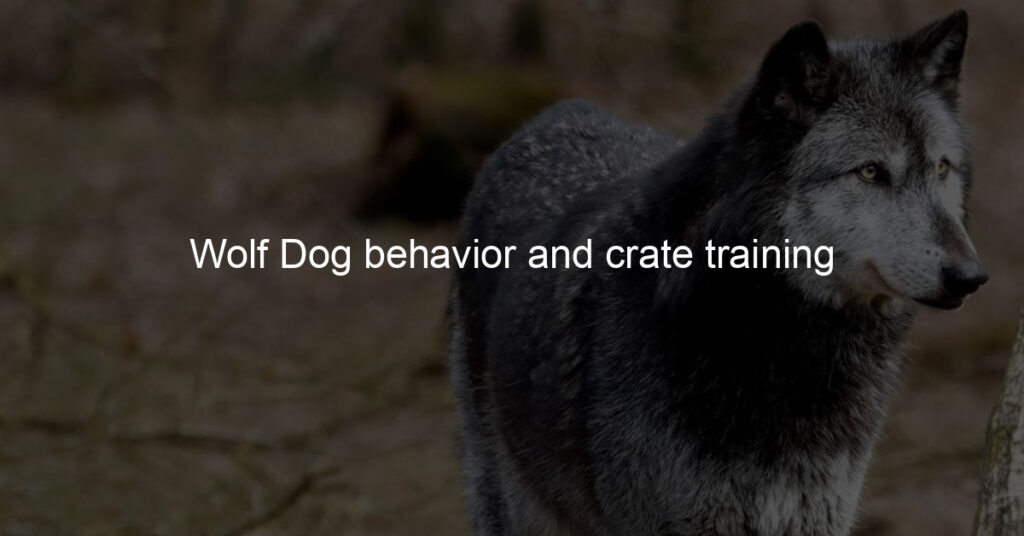Are you a wolf-dog owner? Or do you want to be one soon? If so, there are some things of which you should be mindful—namely, wolf-dog behavior and crate training. As any experienced wolf dog owner will tell you, these two matters can make or break their canine companions’ lives in captivity.
Wolf dogs require extra considerations when it comes to both their nature as wild animals and their need for structure. Here in this blog post, we’ll discuss the basics of understanding your wolf dog’s behaviors and helpful ways how to effectively crate train them for a successful life with humans. So let’s get started!
Can you crate-train a wolf dog?
Crate training a wolf dog is a tricky endeavor that requires patience and kind consistency. Although field abandonment issues and natural behaviors may present unique challenges, it is possible to successfully crate-train a wolf hybrid with proper research, guidance, and dedication.
The key is to understand why wolves appreciate confinement over other forms of training, to make the process as comfortable as possible. Positive reinforcement, practice sessions, and plenty of treats are essential ingredients in teaching your wolf dog how to embrace its crate without feeling scared or restricted.
Do wolf dogs have separation anxiety?
Wolf dogs, also known as wolf hybrids, are a unique species because they are a blend of both wolf and dog DNA. While wolf dogs may also exhibit the same behaviors or psychological problems that many dogs have, their behavior can sometimes be different due to their instincts and traits from their ancestors.
One such behavior is separation anxiety in wolf dogs; it has been theorized that this almost always stems from their wild counterparts who have traditionally roamed in packs rather than being domesticated animals like dogs are today. Many owners have reported having difficulty leaving them alone for extended periods, with some exhibiting destructive behavior or loud vocalization when faced with isolation for too long. Despite this tendency toward loneliness, most owners swear by the devotion and intelligence of their beloved canine companions—proof that even wolf-dog mixtures can make incredible pets.
How much room does a wolf-dog need?
Wolf dogs are beautiful, loyal creatures that require a great deal of space to thrive. These majestic hybrid canines use their environment as much as possible, and they may become bored if they do not have the room they need. While typical backyard breeds can be content with smaller, fenced enclosures, wolf dogs need grazing space that is at least one acre in size.
Furthermore, an extra-large dog house should be included to keep your furry companion warm and sheltered from severe weather. If you have the means and resources to provide a wolf dog with plenty of room, you will be rewarded for years with a loving pet and best friend who will appreciate the care and attention you give him or her.
What is the temperament of a wolf-dog?
Wolf dogs, sometimes called wolf hybrids, are a mix between wolves and domestic dogs. They have a unique temperament that is reminiscent of both the canine sides of their heritage.
Wolf dogs tend to be loyal, intelligent, and independent-minded – much like domestic dogs. Though they can form strong social bonds with humans and other animals, they also retain plenty of natural wariness around strangers.
They may need more space and stimulation than regular pet dogs as they are by nature quite active animals who enjoy roaming wide open areas. Owners should make sure to provide an appropriately stimulating environment for these active creatures to thrive!
Summary: Wolf Dog behavior and crate training
In conclusion, when it comes to wolf-dog behavior and crate training, the best practice is to be consistent and patient. Establishing a routine early on can help alleviate any mishaps down the road. Also, using positive reinforcement tactics like rewarding with treats or praises can go a long way in establishing trust between you and your wolf dog.
Remember: wolves are incredibly intelligent creatures and if you take the time to understand what makes them tick and how they interact, you will be rewarded tenfold. With proper guidance and love, raising a wolf dog can be an incredibly rewarding experience for all involved.








